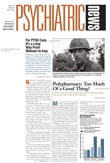Depressed patients treated in VA mental health facilities still commonly receive prescriptions for long-term use of benzodiazepines in combination with antidepressants, despite a lack of data on their effectiveness for depression and significant evidence warning of potential harm.
A large review of patient data from the Veterans Affairs National Registry for Depression indicated that not only is benzodiazepine use very common, but patients who are older, white, or Hispanic and have a comorbid anxiety disorder are highly likely to receive a prescription for benzodiazepine use for longer than six months.
The study, funded by the Department of Veterans Affairs, appears in the April American Journal of Psychiatry.
Marcia Valenstein, M.D., M.S., senior researcher at the VA’s Health Services Research and Development Service’s Serious Mental Illness Treatment, Research, and Evaluation Center in Ann Arbor, Mich., and her research team identified more than 128,000 patients treated for depression in specialty mental health settings in 129 VA facilities during the last three months of 2001. They then used the VA’s advanced pharmacy database to identify those patients with depression who filled a prescription for any benzodiazepine during Fiscal 2001 (October 1, 2001, to September 30, 2002).
Eighty-nine percent of the patients with depression filled a prescription for an antidepressant. Just over one-third (36 percent) filled a prescription for a benzodiazepine. Of that third, 78 percent received more than a 90-day supply, and 61 percent received more than a 180-day supply. In fact, prescriptions for less than a 30-day supply—as recommended in practice guidelines noted below—occurred in only 6 percent of prescriptions.
The likelihood of receiving a prescription for a benzodiazepine was greater for those patients who were white or Hispanic. Older patients were more likely to receive a prescription for a benzodiazepine than were younger patients; however, they generally were prescribed lower doses.
Patients treated in a VA facility located in the southern region of the United States were most likely to receive benzodiazepines, while those in the eastern, central, and western regions were less likely.
In addition, benzodiazepine use varied greatly from among the facilities. For example, in the facility with the highest rate of benzodiazepine prescribing, 67 percent of patients with depression received benzodiazepines. In the facility with the lowest rate of prescribing, only 11 percent of depressed patients got a prescription for a benzodiazepine.
The pattern of use, Valenstein asserted, is directly in conflict with the APA Practice Guideline for the Treatment of Major Depression, as well as several other common medication guidelines (such as those from the American Association for Geriatric Psychiatry and the American Geriatrics Society, with respect to elderly patients) and commonly used medication algorithms (such as the Texas Medication Algorithm Project, or TMAP).
“This repeated finding,” Valenstein and her colleagues concluded, “is surprising, given that physicians must balance the risks and benefits of prescribing benzodiazepines, and the risks appear to increase with age.”
They call for more defined research to understand the phenomenon and “clinicians’ reasons for long-term treatment with benzodiazepines and the effectiveness of this practice.”
Am J Psychiatry 2004 161 654
